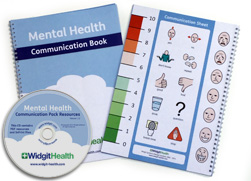
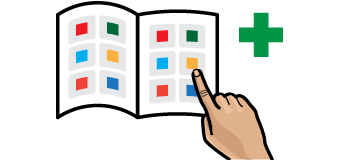
This book is designed to help those carrying out mental health assessments, either in psychiatric or physical health care settings.
It can be used to ask questions and understand responses from people for whom communication is difficult.
This pack contains a printed communication book, plus a CD containing 43 PDF resources and flashcards designed to support mental health professionals.
This project was developed by Widgit Software in partnership with Dr Geoff Marston, Consultant Psychiatrist for adults with a learning disability, Coventry and Warwickshire Partnership Trust, and Dr Irene Cormac, Honorary Consultant Forensic Psychiatrist, Rampton Hospital, Nottinghamshire Healthcare NHS Foundation Trust.
The communication book
The assessor can point to the symbols to add meaning to any questions or statements when speaking with the patient. The patient can also respond by pointing to symbols and by using flash cards.
The structure of the book is designed to complement the order of a standard psychiatric assessment based around the Present State Examination. 'At the back of the book there are core responses, for example 'Yes' and 'No'; as well as a generic scale.
The resources and flashcards
A range of printable resources to support both mental health and general hospital admissions are included in the pack, along with simplified explanations of the main sections of the Mental Health Act 1983 (England and Wales). The pack will be subject to regular review to ensure information is kept up-to-date.
Developing Mental Health Communication
Resources for Professionals
Dr Geoff Marston, Dr Rene Cormac, Tom Jelley
The Royal College of Psychiatrists
Faculty of Intellectual Disability Psychiatry Annual Conference

Communication book
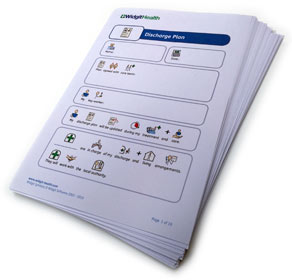
43 PDF resources for mental health
Mental Health Communication Book
The 32 page printed book contains banks of symbols to be used during a psychiatric evaluation.
Mental Health Resources
These PDF resources support patients who are going to a psychiatric ward - from what happens on arrival through to discharge, and an explanation of their Rights whilst in hospital.
Mental Health Act 1983 Sections
These PDF resources explain the patient’s rights and choices when detained under the Mental Health Act 1983 for the following Sections of the Act.
Psychiatrist/Psychologist Visits
The following PDF resources will help with explaining to the patient what will happen when they visit a mental health professional.
General Hospital Resources
The following PDF resources cover general hospital visits - from preparing to stay in hospital, through to leaving. There is also a communication passport to help staff to understand the patient’s needs.
Flashcards
There is a set of PDF flashcards which cover all of the vocabulary; and follow the order of the symbols presented in the Mental Health Communication Book. The flashcards are best used when printed on card and cut out. Multiple cards can be made for common words.
All the resources are available in Key symbols and Full symbols
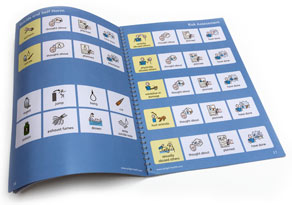
Mental Health Symbols
The Mental Health Pack comes with the over 300 new symbols for Communicate: In Print.
You can use In Print to make your own symbol materials.
The resources also include the flash cards and editable discharge plan as In Print files.
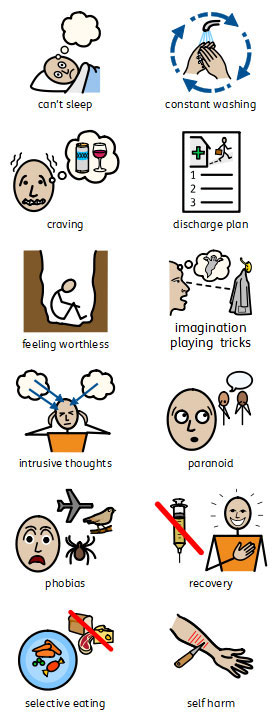
Evaluation
The book and flashcards can be used to aid psychiatric evaluation. They can assist with communication not only for those with speech or language difficulties, but also assist those who have difficulty talking about themselves.
The symbols can provide a vocabulary when the patient doesn’t have the language skills to talk about what they want. They can act as prompts to help convey emotions, feelings and experiences that are difficult to verbalise.
Preparation
New and difficult situations can be distressing, especially for people who need clear routines, such as people with autism. The resources can be used to help prepare someone for what is going to happen or is happening, such as going to a hospital or visiting a health professional. The resources can be used to help to reassure a patient for example about what to expect during treatment, and discharge from hospital.
Explaining a Patient’s Rights under the Mental Health Act 1983
Patients must be informed about the choices they can make and the legalities of their situation. Whether or not a patient is an informal, voluntary patient or if they are detained under the Mental Health Act 1983, it is important to provide information about their Rights.
The resources will also provide the patient with information on how they can get help, who will support them and what to do if they disagree with their treatment or care.
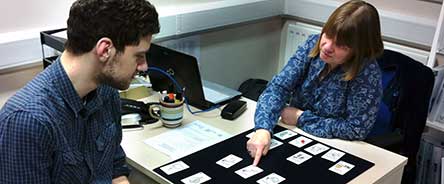
Legal responsibilities
The UK’s Equality Act 2010 places an obligation on all organisations to make reasonable adjustments to ensure that any services they provide for members of the public are extended equally to people with disabilities, including those who have difficulty in reading or understanding the meaning of words. The key principles in this legislation include rights, independence, choice and inclusion. The emphasis is on what people can do, and not what they are unable to do.
There are 2.1 million people
in Great Britain registered with a Communication Disability
and 1.9 million people registered with a Memory, Concentration or Learning Disability.
Office for Disability Issues,
HM Government
Disability facts and figures


The book contains a comprehensive set of symbol-supported vocabulary. Each page covers a different topic related to the various domains of the Mental State Examination.
At the back of the book there are ‘core responses’ that may be used at any time; for example, the responses ‘Yes’ and ‘No’. For easy access for the patient, these pages can be photocopied and flash cards can be given to the patient to use to communicate.
Communication book contents
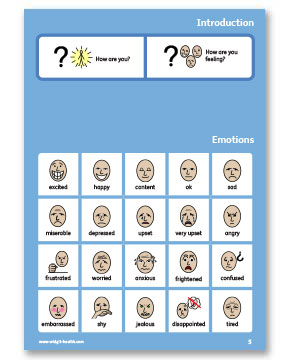
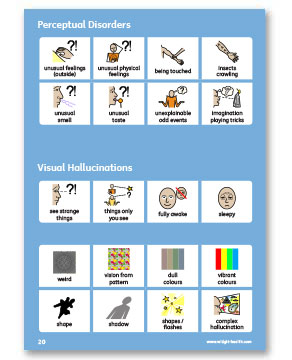
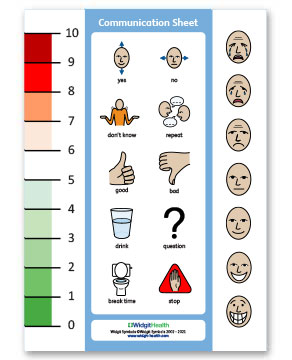
Symbols can be used in different ways depending on the patient’s communication and language needs. Most of the resources supplied in the pack are available in two formats; Key Symbols and Full Symbols.
Key Symbols
Key symbols are simply one or two symbols that can be used alongside text to convey a single piece of information. At most, they provide the same amount of information as a short sentence of text. They can help reinforce meaning and give reassurance by acting as reminders for any level of reader.
Key Symbols work best to reinforce meaning to a person who is able to read text. They can also support non-readers when assisted by someone who can help them understand the message indicated by the key symbols.

Full Symbols
Full symbol documents have a higher level of support than key symbols. Their meaning is supported by illustrating every information-carrying word in the content with a symbol.
Full symbols are appropriate for people who are reading the documents independently, as it allows them to gain the near ‘word for word’ understanding that a brief summary cannot. People who have already used symbols will be most familiar with this method of support.

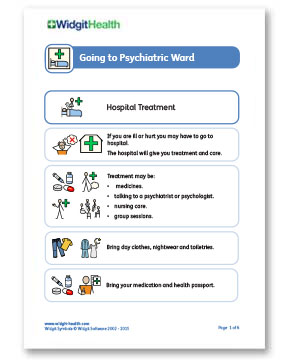
Key symbols page
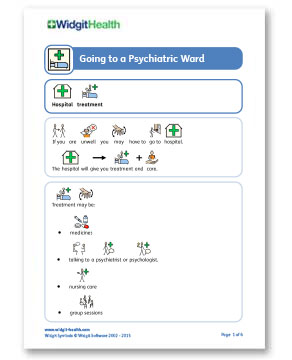
Full symbols page
Flashcards
Flashcards can be used during a conversation as individual prompts. They can support expression of feelings and thoughts by allowing the patient to choose cards that reflect their views. A ‘good’ to ‘bad’ scale, where the patient places cards relatively can help aid the discussion. Flashcards can be particularly effective when displaying a series of events as a timeline, with one symbol representing each event in the sequence.
The flashcards in the pack cover all of the vocabulary in the communication book.
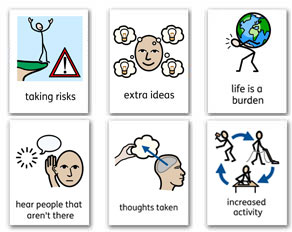
At Widgit we welcome the opportunity to work with professionals to develop new materials. This produces credible resources on a specific subject, whilst ensuring the symbol usage and content is appropriate for the audience.
If you want help with accessibility or have an idea for a resources, please contact us.
For design services,
email
[email protected]
For copyright permission,
email
[email protected]
About this pack
This project was developed by Widgit Software in partnership with Dr Geoff Marston, Consultant Psychiatrist for adults with a learning disability, Coventry and Warwickshire Partnership Trust, and Dr Irene Cormac, Honorary Consultant Forensic Psychiatrist, Rampton Hospital, Nottinghamshire Healthcare NHS Foundation Trust.
Dr Marston has a special interest in education and improving the physical health care of people with a learning disability. Dr Cormac has a special interest in the physical health of people with mental disorders. With Dr David Gray, she has co-edited the textbook ‘Essentials of Physical Health in Psychiatry’.
Our services include:

| Price | ||
| Mental Health Communication Pack - Printed book - CD of PDF resources and InPrint 2 & 3 files |
£50 |
All prices are quoted ex VAT and P&P
For multiple copies, please contact us.
Online:
By Phone: 01926 333 680
By Email: [email protected]
By Post: Mail orders to:
26 Queen Street,
Cubbington,
Leamington Spa,
CV32 7NA,
UK
![]() For more information on our symbol software
For more information on our symbol software
and educational products, visit widgit.com